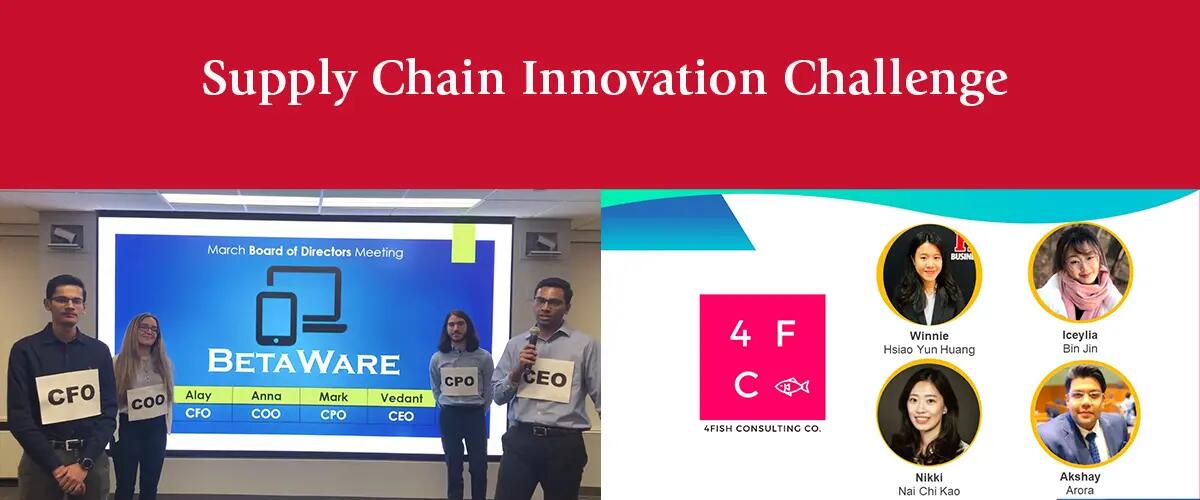
Rutgers Business School Undergraduate Team (left) Anna Pisklarov, Alay Patel, Vedant Patel, Mark Gencer and Graduate Team (right) Akshay Arora, Winnie Hsiao Yun Huang, Bin Jin, Nai-Chi Kao
Graduate and undergraduate teams tie for top prizes in Innovation Challenge
Teams from eight U.S. business schools, at both the graduate and undergraduate level, competed in the RBS 2020 Supply Chain Innovation Challenge for $16,000 in prizes in a real-life case from Panasonic. The team presentations were blind judged by a panel of top-level executives from Estée Lauder, Panasonic, UPS, and Pfizer.
The winners were:
Top Prize for the Undergraduate Innovation Challenge (in a tie)
- Michigan State and Rutgers Business School [Anna Pisklarov, Alay Patel, Vedant Patel, Mark Gencer]
Top Prize for the Graduate Innovation Challenge (in a tie)
- Arizona State and Rutgers Business School [Akshay Arora, Winnie Hsiao Yun Huang, Bin Jin, Nai-Chi Kao]
Dean Lei Lei said, “Even though the full competition was cut short I am very pleased that two Rutgers Business School teams, one graduate and one undergraduate, tied for the Top Prize of the RBS 2020 Supply Chain Innovation Challenge. We are very proud of our students! A special thank you to David Dreyfus, John Impellizzeri, Mark Rodgers, Ingrid Belle and ALL SCM faculty and staff who teach and support our students!”
Students were challenged to come up with innovative solutions that created value through the supply chain and to quantify the potential financial impact. Participating schools were Arizona State University, University of Maryland, Michigan State University, Northeastern University, Rutgers Business School, Stevens Institute of Technology, Syracuse University, and University of Wisconsin-Madison.
The competition presented by the Center for Supply Chain Management featured parallel tracks for undergraduate and graduate teams. Each track consisted of a virtual preliminary round with the original intention for the top two teams to present face-to-face before the committee of judges. However, because of the protective actions taken to keep from spreading COVID-19, the committee decided to divide the award prize equally among the virtual preliminary top winners in this national competition for SCM innovation.
Anna Pisklarov speaking on behalf of the undergraduate team said: “The details for the first round were very unclear so we took our own initiative and were the only team who recorded our presentation live, as opposed to doing a PowerPoint voiceover. We were apprehensive waiting to hear if we moved forward, and when we learned that we did, we were all so ecstatic and were ready to get to work for the final round.
“Just as I sent out a Google calendar invite to everyone to make sure April 16th was open, we were told about the school's decision to close down. It was devastating to us knowing we were ready to compete for first place, and never had that opportunity. It felt incomplete.
“However, once we learned that the competition facilitators wanted to award the top two winning teams and still recognize our hard work, it was definitely some good news in light of this chaos. I am happy with the administration’s decision to make sure both teams knew that their ideas and dedication did not go unnoticed.”
Press: For all media inquiries see our Media Kit


